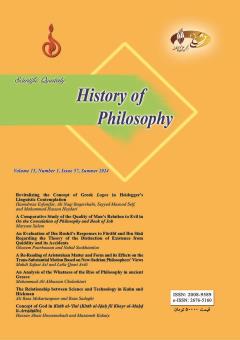The Relationship between Science and Technology in Kuhn and Hickman
Subject Areas : Connection of philosophers’ views and philosophical schools with the social and philosophical conditions of the time
Ali Reza Mokarianpour
1
,
Reza Sadeghi
2
*
![]()
1 - PhD Candidate of Philosophy, University of Isfahan, Isfahan, Iran
2 - Associate Professor, Philosophy Department, University of Isfahan, Isfahan, Iran
Keywords: Philosophy of technology, technoscience, Pragmatism, Larry Hickman, John Dewey, Thomas Kuhn,
Abstract :
The concept of technoscience, as one of the central concepts in the philosophy of technology in the 20th century, has attracted great attention during the recent decades because of the existing concerns regarding the rise of artificial intelligence. In this paper, the authors compare two main views that have been presented in this regard in the 20th century. Larry Hickman, the American pragmatist philosopher, while accepting the concept of technoscience, introduces Thomas Kuhn as one of its opponents. Here, the authors investigate Kuhn’s reasons for rejecting the unity of science and technology and then criticize his view based on the fundamental principles of Hickman’s philosophy in defense of the concept of technoscience. Their main argument is that Kuhn’s view, although branded as a finding in the history of science, enjoys an ideological nature and weakens the objective bases of science. The significance of Hickman’s view lies in the fact that, relying on Dewey’s philosophy, he introduces technoscience as a teachable and, thus, manageable field.
چايلد، گوردون (1364) جامعه و دانش، ترجمة محمدتقي فرامرزي، تهران: سهروردي.
دگره، گرارد (1370) علم و ساخت اجتماعی، ترجمة محمد توکل، چاپ توکل.
کوهن، تامس (1390) ساختار انقلابهای علمی، ترجمة سعيد زيباکلام، تهران: سمت.
کوهن، تامس (1392) تنش جوهری: جستارهايی دربارۀ دگرگونی و سنت علمی، ترجمة علي اردستاني، تهران: رخداد نو.
محمدپور، احمد (1387) «ژان فرانسوا لیوتار و پیدایش علوم اجتماعی پست مدرن: خاستگاه نظری و مبانی پارادایمیک»، نشریه علوم اجتماعی دانشگاه فرودسی مشهد، سال 5، شمارۀ 1، ص82ـ39.
منصوری، علیرضا؛ پایا، علی (1400) علوم انسانی بمثابه تکنولوژی، تهران: پژوهشگاه علوم انسانی و مطالعات فرهنگی.
Bordeau, E. J. (1971). John Dewey's ideas about the great depression. University of Pennsylvania Press.
Davis, M. (2006). American pragmatism and technology. Techné. vol. 10, no. 2. pp. 131-140.
Dewey, J. (1908). Ethics. H. Holt and Company
Dewey, J. (1929). The quest for certainty: Gifford lectures. New York, Minton: Balch & Company.
Dewey, J. (1939). Freedom and Culture. New York: G. P. Putnam Son.
Dewey, J. (1984). The collected works of John Dewey, the middle works: 1899–1924, fundamentals. Southern Illinois University Press
Dewey, J. (2013). A common faith. Yale University Press.
Feenberg, A. (2003). Pragmatism and critical theory of technology. Techné. vol. 7, no. 1.
Feyerabend, P. (1995). Two letters of Paul Feyerabend to Thomas S. Kuhn on a draft of the structure of scientific revolutions. Studies in History and Philosophy of Science, vol. 26, no. 3, pp. 353-387.
Feyerabend, P. (2006). More letters by Paul Feyerabend to Thomas S. Kuhn on proto-structure. ed. by P. Hoyningen-Huene. Studies in History and Philosophy of Science. vol. 37, no. 4. pp. 610-632.
Garnar, A. W. (2012). Hickman, technology, and the postmodern condition. Technè, vol. 16, no. 3, pp. 231-251.
Hickman L. (1990). John Dewey's pragmatic technology. Indiana University Press.
Hickman L. (2001). Philosophical tools for technological culture: putting pragmatism to work. Indiana University Press.
Ihde, D. (1993). Postphenomenology: Essays in the Postmodern Context, Evanston. Northwestern University Press
Ihde, D. (2009). Technology and Science. A companion to the philosophy of technology. ed. by J. K. Berg Olsen, S. A. Pedersen & V. F. Hendreick. Sussex: Wiley-Blackwell.
Kuhn, T. S. (2000). The road since structure: philosophical essays, 1970–1993, with an autobiographical interview. Ed. by J. Conant & J. Haugeland, Chicago: University of Chicago Press.
Lyotard, Jean-Francois (1979). New Technologies. Political Writings, trans. G. Bennington and B. Massumi. Minneapolis: University of Minnesota Press.
Popper, K. (1970). Normal science and its dangres. in I. Lakatos & A. Musgrave (eds.), Criticism and the growth of knowledge. Cambridge: Cambridge University Press. pp. 51-58.

